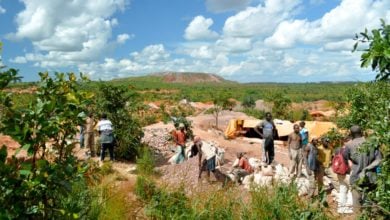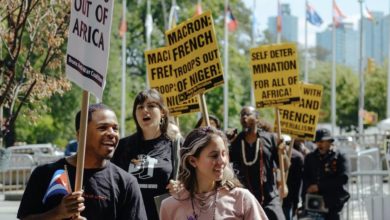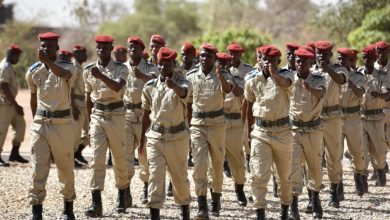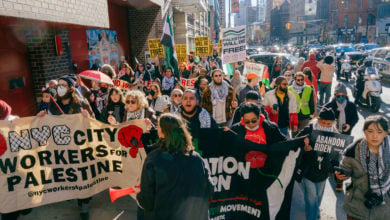With increasing volatility in the Middle East due to U.S. imperialist intervention, the U.S. government is looking to secure additional sources of oil. African oil is at the top of the list.
A recent Sept. 14 Reuters article by David Morgan gives insight into U.S. imperialism’s increasing interest in Africa. The
 |
According to Morgan, U.S. special forces operatives are already in the Gulf of Guinea trying to stave off the spread of Al-Qaida. But the real reason for these special forces in Africa is much different.
In order to protect U.S. corporations’ profits and capital investments, the Pentagon moved U.S. special forces into the Gulf of Guinea. Soldiers were sent to Chad, Mali and Nigeria as part of a program called the Pan-Sahel Initiative for the purpose of “counter-terrorism” training.
The Pentagon is considering the islands of São Tomé and Príncipe, in the heart of the Gulf, as candidates for a permanent military base. The U.S. military views these islands as a future Diego Garcia for western Africa. Diego Garcia is a key U.S. military base in the Indian Ocean that played a critical role in the imperialist invasions of Afghanistan and Iraq.
African oil at issue
Daily oil production by the Gulf of Guinea states—Nigeria, Congo, Gabon, Cameroon and Equatorial Guinea—is over 4.5 million barrels. The total is more than Iran, Saudi Arabia or Venezuela produces individually.
The top two U.S. oil companies, Chevron Texaco and Exxon Mobil, plan to invest $70 billion in oil production over the next 5 to 10 years in the Gulf of Guinea. The states in this region already provide 16 percent of the United States’ oil supply. The amount is expected to rise to 25 percent by 2015.
Controlling as many oil sources as possible is one of the U.S. government’s primary objectives worldwide. It wants to hold a strategic lock on oil markets so that it can control the flow of oil and other essential resources to countries like China and India, and to imperialist rivals in Europe and Japan. The U.S. government’s new moves and “threat” assessments in Africa are largely predicated on prevailing over its rivals.
To carry this out, the Pentagon has admitted that, in Africa, it is pursuing a strategy of low-intensity warfare, which “has been used by the U.S. military in developing countries since World War Two.” (Reuters, Sept. 14) Similar campaigns are also underway from the Philippines to the Caucasus and Latin America. Morgan cites “independent analysts” as saying that the strategy “could grow to include 60 countries.”
Right-wing commentator Max Boot of the pro-imperialist Council on Foreign relations recently said about Africa, “The ideal is El Salvador in the 1980s, where the whole U.S. force structure was limited to 55 special forces operatives who actually achieved more than 550,000 troops did in Vietnam.”
A similar logic is at play in Iraq. In January 2005, U.S. generals and then-ambassador to Iraq, John Negroponte, instituted the “Salvador Option.” This meant creating, funding and arming death squads to seek out and kill resistance leaders, fighters and supporters.
In the 1980s, under the direction of John Negroponte, the Salvadoran military carried out large-scale massacres of peasant communities that were considered supportive of the FMLN resistance fighters in El Salvador. It was similar to the CIA’s Phoenix Program in Vietnam. The program was really a clandestine war that assassinated as many 50,000 south Vietnamese who were considered to be members or sympathizers of the National Liberation Front.
U.S. imperialism wants an African military command
A major U.S. military goal in Africa is to create an Africa Command that would combine disparate elements of the U.S.
 |
A small but stable U.S. military force in Africa is already a reality. The U.S. military has bases in several strategically located African countries. Two-thousand U.S. Defense Department personnel also are stationed in the Horn of Africa at this time.
The U.S. military is expected to receive hundreds of millions of additional dollars for more operations in the near future. This should raise the eyebrows of any critical observer.
U.S. imperialism’s interest in Africa is nothing new. Africa was a key battleground in the so-called Cold War. During the 1960s and 70s, he U.S. government massively funded and supported racist apartheid states, like South Africa and Rhodesia, now Zimbabwe.
The imperialists also sought to destroy national liberation movements all over Africa.
The U.S. government funded reactionary states and movements as a way to attempt to maintain the status quo of colonial subjugation for millions of Africa’s people. It wanted to stop the rapid spread of pro-communist and pro-Soviet ideas and influence. But the imperialists failed.
The Soviet Union and other socialist countries, like Cuba, provided many of the national liberation movements with much-needed military and economic support and international solidarity. Countries like South Africa, Angola, Namibia, Zimbabwe, Mozambique and many others were greatly aided in their independence struggles by this support. What makes the situation in Africa different now is that the socialist bloc no longer exists.
But dominating Africa will not be easy for the imperialists. The African peoples’ consciousness and will to struggle cannot be easily stamped out. People in Africa and all over the world know that Africa is not for the U.S. government or any imperialist power to carve up and exploit.





